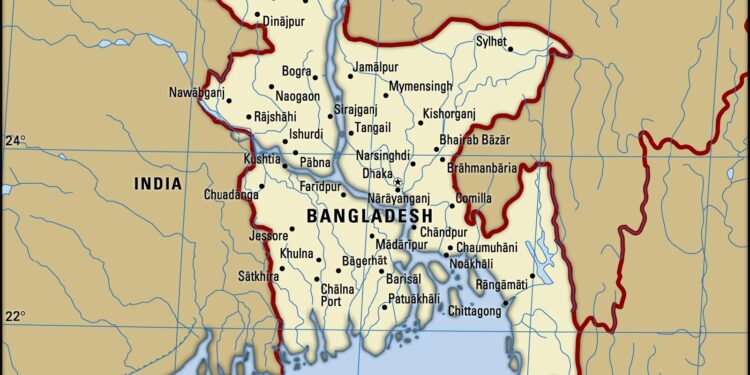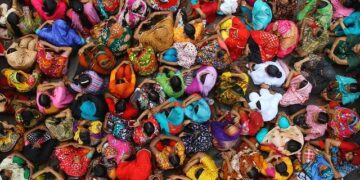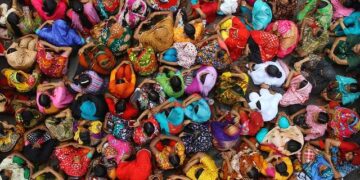In a rapidly changing socio-political landscape, Bangladesh finds itself at a crossroads, as a wave of modernization and economic growth collides with the persistent influence of Islamist hard-liners. The South Asian nation, once heralded for its strides in democracy and development, is witnessing a resurgence of extreme ideologies that threaten to disrupt its progress. As the government undertakes bold reforms aimed at reshaping its identity, Islamist groups are seizing this moment of transition to amplify their voice and regain traction. This article explores the complexities of Bangladesh’s reinvention, the motivations behind the hard-liners’ resurgence, and the implications for the country’s future as it navigates the delicate balance between tradition and modernization.
Bangladesh’s Shift Towards Modernity Sparks Resurgence of Islamist Movements
The rapid pace of modernization in Bangladesh, underscored by its ambitious economic initiatives and increasing global integration, has created a fertile ground for the resurgence of Islamist movements. Historically, these groups have thrived in the shadows of major societal changes, capitalizing on the uncertainty and discontent that can accompany progress. As many citizens grapple with the implications of urbanization, rising inequality, and cultural shifts, Islamist hard-liners are seizing this moment to position themselves as defenders of traditional values against what they deem as the corrosive influences of Westernization and secularism.
This dynamic has led to a notable uptick in popular support for groups advocating for a return to Islamic principles within governance and society. Citizens, especially in rural areas, are increasingly drawn to narratives that promise stability and moral clarity amid the chaos of modern life. The rise of digital platforms has further enabled these movements to spread their messages effectively, engaging younger populations disillusioned with established political entities. Key factors contributing to this shift include:
- Economic Disparities: Growing wealth gaps fueling resentment.
- Cultural Manipulation: Preservation of cultural identity against globalization.
- Insecurity: Fear of crime and instability prompting a search for security in religious dogma.
While the government continues to strive for a secular outlook and sustainable development, the complexities of managing religious sentiments in a rapidly changing environment pose an ongoing challenge. The interplay between modern aspirations and traditional values complicates the nation’s socio-political landscape, potentially leading to increased polarization. To illustrate this shifting balance, consider the following trends:
| Trend | Impact |
|---|---|
| Increased Religious Mobilization | Strengthening of Islamist groups’ influence in local politics. |
| Withdrawal from Secular Ideals | Challenge to government’s authority and policies. |
Navigating the Balance: Addressing Radicalism Amid Democratic Aspirations
The fluctuating political landscape in Bangladesh presents a complex battleground where aspirations for democratic governance coexist with rising radicalism. As the nation grapples with its identity amidst economic challenges and social changes, extremist groups are leveraging discontent to gain traction. Recent developments indicate a concerning trend, where the hard-liners are increasingly positioning themselves as champions of a disillusioned populace, often exploiting sentiments relating to corruption, inequality, and cultural preservation. This juxtaposition reveals a critical tension: on one hand, the desire for democratic freedoms, and on the other, the allure of a radical agenda promising stability and order.
To effectively counter this rising tide of radicalism, it is imperative that the government and civil society initiate proactive measures focused on fostering inclusivity and addressing root causes of disenfranchisement. Key strategies could include:
- Engagement with youth to offer alternatives to extremist narratives.
- Promotion of economic opportunities to alleviate pressures stemming from poverty and unemployment.
- Strengthening educational frameworks that promote critical thinking and tolerance.
- Encouraging interfaith dialogue to build bridges across diverse cultural and religious communities.
Through a multi-faceted approach that encompasses economic, social, and political dimensions, Bangladesh can forge a path towards a more robust democracy that effectively mitigates the appeal of radical ideologies. Only by addressing the underlying issues can the nation hope to realize its democratic aspirations while safeguarding against the encroachment of extremism.
Strategies for Reinforcing Secularism in Bangladesh’s Evolving Political Landscape
In the face of increasing challenges from hard-line Islamist factions, reinforcing secularism in Bangladesh requires a multi-faceted approach. Education emerges as a crucial pillar in this endeavor, where curricula are reformed to promote critical thinking and scientific reasoning over dogma. This includes the incorporation of secular values at all educational levels, from primary schools to universities, fostering an environment of tolerance and respect for diverse beliefs. Additionally, civic engagement initiatives can empower communities to advocate for secular principles, countering extremist ideologies by showcasing the benefits of inclusive governance and pluralism in society.
Moreover, the role of civil society organizations cannot be overstated in this evolving political landscape. They must engage in advocacy campaigns that highlight the importance of secularism in preserving democracy and human rights. These organizations can collaborate with media outlets to amplify voices that promote secular narratives, reaching broader audiences and countering extremist propaganda. Furthermore, local governments should support initiatives that celebrate cultural diversity through festivals and public events that honor various religious and secular traditions, creating a shared sense of national identity that transcends sectarian divides. The commitment to secularism must be reflected in policies aimed at protecting the rights of minorities and fostering dialogue among different societal groups.
| Strategy | Description |
|---|---|
| Educational Reform | Integrating secular values into curricula to promote critical thinking. |
| Civic Engagement | Empowering communities to advocate for secular governance. |
| Media Collaboration | Partnering with media to amplify secular narratives and counter extremism. |
| Cultural Celebrations | Promoting events that highlight cultural and religious diversity. |
The Way Forward
In conclusion, as Bangladesh navigates a complex landscape of economic development and social change, the resurgence of Islamist hard-liners presents a significant challenge to its democratic institutions and secular traditions. While the government strives to modernize and fulfill the aspirations of a youthful population, extremist ideologies threaten to exploit the uncertainties that accompany transformation. This delicate balancing act will require not only robust political will but also a concerted effort from civil society and global partners to ensure that the future of Bangladesh remains anchored in its diverse cultural heritage and commitment to pluralism. The unfolding dynamics in this South Asian nation serve as both a cautionary tale and a potential roadmap for other countries facing similar struggles in the face of upheaval and change. As the situation evolves, the world’s eyes will remain fixed on Bangladesh, watching closely to see how it shapes its identity in the coming years.














